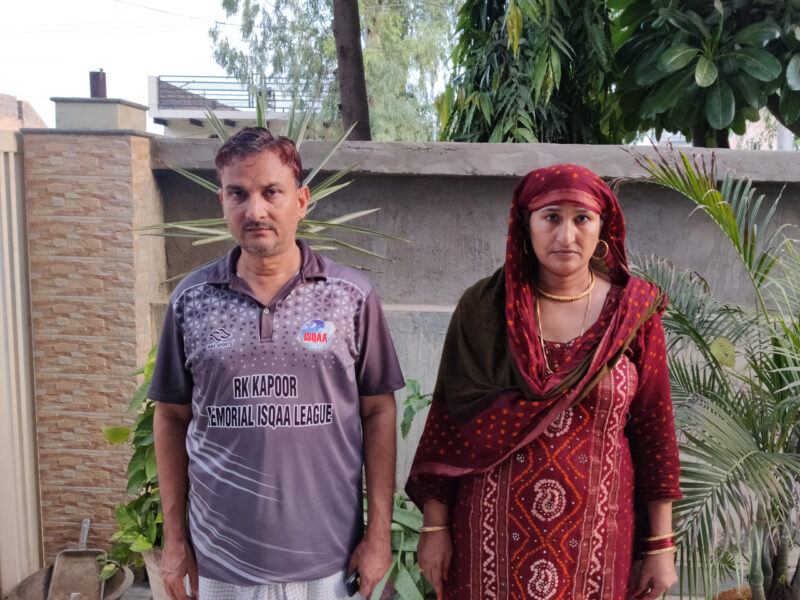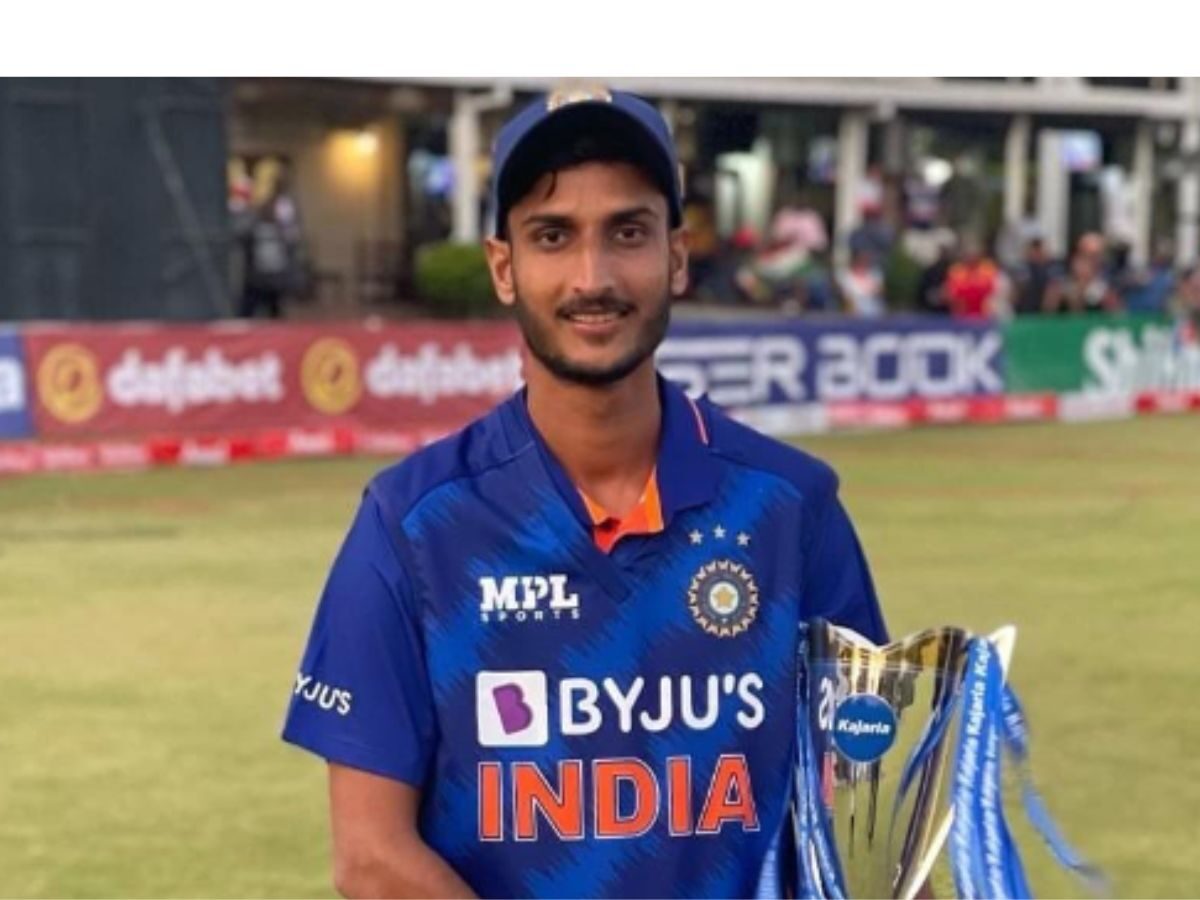Hakeem Ajmal Khan, a local religious figure and a writer who died a couple of years back at 88, is credited for stimulating the thirst for cricket in Shikrawa. It’s a tiny village in Haryana, just 110 km off Delhi. It’s also the hometown of Shahbaz Ahamad.
Shahbaz is the first from the Mewat region to not just break into an India squad – touring Zimbabwe recently – but also play first-class cricket. He is a left-arm orthodox spinner and a left-handed batsman.
Off the bat
Ajmal Khan, whose father Abdul Shakoor was the first to write the history of the Mewati people known as Meos, visited Pakistan in the 1970s. “He and his kids went to meet relatives and acquaintances in Pakistan (where they had moved during Partition) and returned with a cricket bat. They’d play with it. We were amused and also longed for one. Since we didn’t have one, we chiselled out our own bat from wood, like one from a leg of a charpoy”, recalls 59-year-old Naseeruddin, a retired police inspector.
Naseeruddin was the only one among his five brothers to play cricket in the village surrounded by agricultural fields. The eldest of them, Mohammad Ishaq, worked as a primary school teacher in Islamia Middle School (called Islami Madrasa locally and run by Ajmal Khan’s family), before moving to a government school in a village nearby. He didn’t play cricket at all.
But Ishaq, now 73 and retired, would always follow international cricket through radio commentary. Under all-rounder uncle Naseeruddin’s influence and their father Ishaq’s habit of listening to the commentary, Ahmad and Farookh picked cricket and went on to star for their village team, winning trophies, earning accolades and travelling across the villages, including the neighbouring state of Rajasthan.

While both sons and a daughter of Farookh, the better cricketer, chose to study medicine, older brother Ahmad’s son Shahbaz was intoxicated by cricket from an early age. He went to study engineering at Manav Rachna International University in Faridabad.
The move to the university also opened a floodgate of opportunities to play cricket. He enrolled in an academy and was called to the Haryana state Ranji camp twice, though he couldn’t make the team. He also played club matches, building his reputation.
“My dad and uncle used to play at Mewat level, for their village. I developed an interest in cricket by watching them. A lot of kids [from Mewat] never took up cricket professionally but I always played it professionally. That is why I advanced”, explains Shahbaz, just after his return from Zimbabwe, where he was with the Indian team but didn’t get a game.
Right moves
“I feel Mewat players don’t get a direction. I was lucky; I used to play in Faridabad and Palwal since early days. I saw the good players and knew that I can move forward and play Ranji Trophy. I got to know all that at the right time and moved in the right direction”, adds Shahbaz. “I played cricket with the leather (cricket) ball only outside Mewat. That standard of cricket is not in Mewat. Mewat district is not affiliated separately to Haryana Cricket Association. If there were a district setup or even an academy, cricketers could have progressed as there is abundant talent”, he adds.
He says that even today, he doesn’t hear of any Mewati player playing in a district team.
The southpaw stayed in Shikrawa, studying till Class 5 at the Islamia Middle School, playing cricket in its ground and also beyond the school wall in an adjoining field.
“He started playing cricket since the age of three. I’d bowl to him before he’d go to school,” says Farookh, 49, who teaches classes 6, 7 and 8 in a nearby village school.
Ahmad Jan shifted to Hathin, a village 13 km from Shikrawa, after getting a job at the Sub-Divisional Magistrate’s office. He has now risen to the post of a reader there. Shahbaz did further schooling at St John Sr Sec School, Hathin as he looked for cricketing opportunities in Palwal and Faridabad.
Even in the university in Faridabad, he became known for his game.
Mubarak Hussain, from Hathin and now living in Faridabad, says, “A decade back, I would call Shahbaz to matches at India Gate and other places since we wanted to win games. He was a match-winner.”
Adil Khan, a relative, recalls the big hits from Shahbaz saying, “Once, he was batting and broke windows of a building’s section. The management told him to restrain from hitting the kind of shots that’d break windows”, recalls Adil.
Success in Bengal
Shahbaz played for Gurgaon district for 2-3 years. “He did well in district cricket. But after not getting a chance with the Haryana team despite being in the state camp twice, his friends Pramod Chandila and Arun Chaprana, who were playing club cricket in Bengal, asked him to pack his bags and try luck in the eastern state. They said, “Yahaan tera kucchh nahin hone waala. Bengal chal” (Here, you won’t get a chance, try Bengal),” recalls Ahmad Jan.
Shahbaz played for Tapan Memorial Club, sharing a flat and household chores (washing dishes mainly) with Chandila and Chaprana. After loads of runs and bagful of wickets in league cricket, there was no looking back. He made it to the Bengal state team, making his Ranji debut in December 2018, just after his List A debut earlier in September. In February 2019, he was in the Bengal T20 team.
His performances in domestic cricket earned him a contract with IPL franchise Royal Challengers Bangalore and have now brought him to the notice of national selectors.
The enormity of his achievement can be gauged from what Meo (Mewati) historian, Saddique Ahmad Meo, has said: “No other Mewati has gone this far in any sport. We had a player, Madan Lal, who played for Haryana in 1970s in age-group cricket. He was from Nuh. He and Kapil Dev had played together. But he couldn’t play Ranji.”
“There were some wrestlers at the local level like Kaapla from Bisru, a kabaddi player Jan Mohammed Khan from Aali Meo, but no one could make it big”, he adds.
Lack of facilities
The Mewat region, which stretches 100 km north-south and 70 km east-west, nibbles into three states – Rajasthan, Haryana and Uttar Pradesh. There were Meo villages in Delhi too but they got emptied first during the British Raj in 1905, making way for the Lutyens zone. Then, during the 1947 Partition, it also made its way to outer Delhi.
“Because it is divided into three states and is dependent on state governments, it often gets ignored”, adds Meo.
Sports is no different, evidently, as even when Haryana milks medals at the National Games, and provides quality international athletes, Mewat has no facilities. “We only have a few grounds in school. Children play on open fields sans guidance”, says Farookh.
Not much has changed in terms of facilities since 1990, when Farookh saw a bat with a sports equipment supplier in Faridabad, only to find that it cost Rs 10,000 and was used by [Delhi’s star batsman] KP Bhaskar.
“We only had Rs 5,000. We told him, we’ll get the money. He gave us a week’s time since the bat was in demand. We collected Rs 100 from each house and managed to buy it,” he recalls.

With limited schools and avenues for education, and a lack of awareness, the sports situation in Mewat is grim. “The kids are much more interested in sports than studies. They have talent. But they will play in open fields that are used for cattle grazing, and wither away”, says Asad Kamaal, a professor at Government Polytechnic in Hathin.
During his younger days, Shahbaz made a pitch in a field behind his house as he wanted to play. Kamaal says someone as devoted as Shahbaz can make it big from here alone.
While Ahmad Jan says they will try to appeal to Haryana Cricket Association to grant it district status in intra-state competition, the first step to develop cricket talent is about to be taken.
Shahbaz has bought a piece of land and will soon add some more to it to set up an academy for youngsters. That’ll be the first nursery for cricket in the area. “It will require a lot of effort and money, coaches, equipment. We are hoping to set it up in a few years’ time,” says Farookh.
For more stories that cover the ongoings of Delhi NCR, follow us on:
Instagram: instagram.com/thepatriot_in/
Twitter: twitter.com/Patriot_Delhi
Facebook: facebook.com/Thepatriotnewsindia





